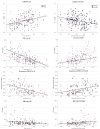Cross-Sectional Analysis of Sleep Quality and Vascular Health in Shift- and Day-Working Nurses
- PMID: 41133668
- PMCID: PMC12551026
- DOI: 10.3390/clockssleep7040058
Cross-Sectional Analysis of Sleep Quality and Vascular Health in Shift- and Day-Working Nurses
Abstract
Sleep disturbances and shift work are associated with increased cardiovascular risk, possibly through disruptions in endothelial and hemostatic function. While prior studies link acute sleep deprivation to vascular dysfunction, the impact of chronic sleep quality and circadian misalignment on endothelial health in healthy individuals, particularly shift workers, remains underexplored. The aim of this study was to examine the association between objectively measured sleep quality and endothelial/hemostatic function in healthy female hospital nurses, comparing shift and day workers, and considering time-of-day variation. In this repeated-measures study, 100 female nurses (51 shift, 49 day workers) aged 25-50 wore actigraphy devices for 7-14 days to assess total sleep time (TST), sleep efficiency (SEF), and wake after sleep onset (WASO). Endothelial function was measured using EndoPAT (Reactive Hyperemia Index-RHI). Hemostatic markers included plasminogen activator inhibitor-1 (PAI-1), von Willebrand factor (VWF), heparanase and heparanase procoagulant activity assessed by ELISA, and chromogenic assays in morning and evening. TST was not associated with any vascular outcomes. Poor sleep quality (low SEF, high WASO) was significantly associated with reduced RHI and elevated PAI-1 level, heparanase level, and heparanase procoagulant activity levels. Regression models revealed significant main effects of SEF and WASO on endothelial and coagulation markers, with some interactions depending on shift type and time of measurement. No significant associations were found for VWF. Impaired sleep quality, but not sleep duration, is associated with endothelial dysfunction and procoagulant activation, particularly among shift-working nurses. These findings suggest that sleep quality may play a critical role in vascular health and support the use of sleep-based interventions to reduce cardiovascular risk in shift-working populations.
Keywords: coagulation; endothelial dysfunction; hemostatic; sleep efficiency; social jetlag; total sleep time.
Conflict of interest statement
The authors declare no conflict of interest.
Figures



References
-
- Salari N., Khazaie H., Abolfathi M., Ghasemi H., Shabani S., Mohammadi M., Rasoulpoor S., Khaledi-Paveh B. The effect of obstructive sleep apnea on the increased risk of cardiovascular disease: A systematic review and meta-analysis. Neurol. Sci. Off. J. Ital. Neurol. Soc. Ital. Soc. Clin. Neurophysiol. 2022;43:219–231. doi: 10.1007/s10072-021-05765-3. - DOI - PubMed
LinkOut - more resources
Full Text Sources
Miscellaneous

